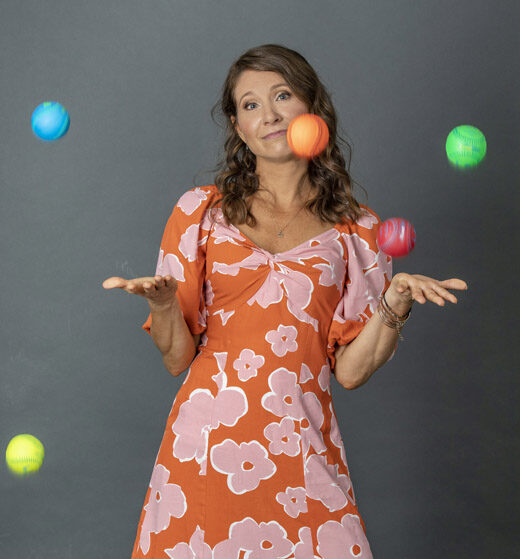
It was quite literally the eighth time in my six-hour shift. I was becoming more and more frustrated. My genuine smile was gone, replaced by an occasional forced upturn of my mouth that rarely reached my eyes. My breathing was shallower. Everything inside my head was screaming. Well, I won’t say what I was thinking, but it wasn’t nice. The “PG” version goes a little something like, “Are you kidding me? Again?”
Usually, my selective hearing game is on point. I have a knack for turning down the volume on things I don’t want to hear (comes in handy being married to a drummer).
Not today. Maybe it was the relentless heat and humidity, or perhaps it was simply the excessive number of times this one song was requested and played.
I knew I’d had it when I preferred the sound of the blender grinding out the hundredth virgin strawberry daiquiri of the day—the sound of the whirring and that distinct high-pitched shrill that tells you to add more liquid. This is what I preferred to listen to over live music.
Meanwhile, my cringe-worthy experience was oh so very different from the tourists surrounding me. They were living their best lives, raising their hamburgers and margaritas in the air in a vacation-like solidarity. I think someone even found a lost shaker of salt. While encouraging their littlest ones to dance, they drank in every note as if their whole vacation teetered on this moment.
Even though I couldn’t help but sing along to this incredibly catchy tune, my emotional response was clearly not the same as the patrons I was serving. Same song. Drastically different experiences.
But I have other songs. Depeche Mode’s “People Are People” was one of those songs in college. I was a psychology major, so it makes sense if you read the lyrics. This song greeted everyone who entered my car—followed by singing at the top of my lungs, dancing around, and feeling understood … by the music. My friends, not so much. They usually led with, “Seriously? Again?” Or, to quote one friend, “Really? Can we listen to anything else?”
Music has always had a significant impact on my life. I grew up surrounded by all genres of music and access to quite a few instruments. If I wasn’t reading, I was singing, sometimes even combining the two. It was quite honestly the only way I knew how to study in school.
I gave and received music in the form of mixed tapes, later CDs, and eventually Spotify lists to help set a mood. It helped me tune people out when I wanted nothing more than time to myself. Or tune people in when I craved the connection music brought at parties, festivals, and concerts.
I’m going to guess you’ve experienced something similar. A particular song (or several) that transports you back to a special time in your life where you feel all the feels and your body can’t help but move in time. When the lyrics touch your soul in a way that, before you know it, you’re singing along, maybe even at the top of your lungs. Hello, car beside you at the stop light.
It probably won’t surprise you that research has revealed that music engages various regions of the brain associated with emotions, memory, and reward. It shows slow-tempo, harmonious melodies lower heart rate, reduce cortisol levels (the stress hormone), and promote calmness or relaxation. On the flip side, music with a faster tempo tends to cause the release of dopamine and serotonin. These chemicals spark feelings of pleasure and joy and even reduce stress.
Beyond its impact on emotions, music also has the power to enhance cognitive functions. Research suggests that playing musical instruments or engaging in activities like singing can improve memory, attention, and problem-solving skills.
Music is a communal experience that brings people together, fostering social connections and empathy. Whether singing along with live music or participating in a choir, shared musical experiences strengthen bonds between individuals. The synchronization of emotions during a show or the camaraderie of a musical collaboration can promote a sense of belonging and reduce feelings of loneliness.
There are plenty of messages in the music. Music tells a story—and not just the lyrics. The rhythms and beats all speak to our bodies, having us slow down or speed up.
Here’s the good news. There’s no right or wrong way to take in the positive effects of music, and there’s no magic “dose” or prescription. I think it’s safe to say you can’t overdo it.
In a world that often feels chaotic and overwhelming, music is a powerful and accessible tool for enhancing our emotional and mental well-being. Its ability to evoke emotions, reduce stress, improve cognitive functions, foster social connections, and serve as a therapeutic outlet underscores its profound impact on human psychology. Whether we seek solace in a melancholic melody or motivation from an upbeat rhythm, music is a universal remedy that enriches our lives in ways beyond measure.
So, when a listener or several have requested “Wagon Wheel,” “Free Bird,” or maybe even “Margaritaville” (RIP Jimmy Buffett) for the ninetieth time, know that there’s a synaptic bam happening, harkening your listeners back to an enjoyable time in their lives, where stress fades away and joy takes center stage.
Sheila Tucker is a licensed marriage and family therapist and founder of Heart Mind & Soul Counseling. She specializes in working with couples and individuals to better their relationships so they can connect more deeply to themselves and each other. When not in the office, you’ll find her walking her pups or planning her next mountain getaway with her husband.


